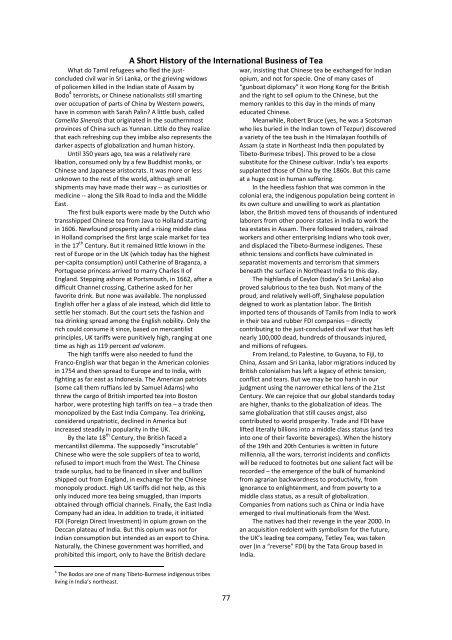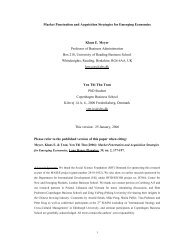AIB Cooking Book - Klaus Meyer homepage
AIB Cooking Book - Klaus Meyer homepage
AIB Cooking Book - Klaus Meyer homepage
You also want an ePaper? Increase the reach of your titles
YUMPU automatically turns print PDFs into web optimized ePapers that Google loves.
A Short History of the International Business of Tea<br />
What do Tamil refugees who fled the just‐<br />
concluded civil war in Sri Lanka, or the grieving widows<br />
of policemen killed in the Indian state of Assam by<br />
Bodo 4 terrorists, or Chinese nationalists still smarting<br />
over occupation of parts of China by Western powers,<br />
have in common with Sarah Palin? A little bush, called<br />
Camellia Sinensis that originated in the southernmost<br />
provinces of China such as Yunnan. Little do they realize<br />
that each refreshing cup they imbibe also represents the<br />
darker aspects of globalization and human history.<br />
Until 350 years ago, tea was a relatively rare<br />
libation, consumed only by a few Buddhist monks, or<br />
Chinese and Japanese aristocrats. It was more or less<br />
unknown to the rest of the world, although small<br />
shipments may have made their way ‐‐ as curiosities or<br />
medicine ‐‐ along the Silk Road to India and the Middle<br />
East.<br />
The first bulk exports were made by the Dutch who<br />
transshipped Chinese tea from Java to Holland starting<br />
in 1606. Newfound prosperity and a rising middle class<br />
in Holland comprised the first large scale market for tea<br />
in the 17 th Century. But it remained little known in the<br />
rest of Europe or in the UK (which today has the highest<br />
per‐capita consumption) until Catherine of Braganza, a<br />
Portuguese princess arrived to marry Charles II of<br />
England. Stepping ashore at Portsmouth, in 1662, after a<br />
difficult Channel crossing, Catherine asked for her<br />
favorite drink. But none was available. The nonplussed<br />
English offer her a glass of ale instead, which did little to<br />
settle her stomach. But the court sets the fashion and<br />
tea drinking spread among the English nobility. Only the<br />
rich could consume it since, based on mercantilist<br />
principles, UK tariffs were punitively high, ranging at one<br />
time as high as 119 percent ad valorem.<br />
The high tariffs were also needed to fund the<br />
Franco‐English war that began in the American colonies<br />
in 1754 and then spread to Europe and to India, with<br />
fighting as far east as Indonesia. The American patriots<br />
(some call them ruffians led by Samuel Adams) who<br />
threw the cargo of British imported tea into Boston<br />
harbor, were protesting high tariffs on tea – a trade then<br />
monopolized by the East India Company. Tea drinking,<br />
considered unpatriotic, declined in America but<br />
increased steadily in popularity in the UK.<br />
By the late 18 th Century, the British faced a<br />
mercantilist dilemma. The supposedly “inscrutable”<br />
Chinese who were the sole suppliers of tea to world,<br />
refused to import much from the West. The Chinese<br />
trade surplus, had to be financed in silver and bullion<br />
shipped out from England, in exchange for the Chinese<br />
monopoly product. High UK tariffs did not help, as this<br />
only induced more tea being smuggled, than imports<br />
obtained through official channels. Finally, the East India<br />
Company had an idea. In addition to trade, it initiated<br />
FDI (Foreign Direct Investment) in opium grown on the<br />
Deccan plateau of India. But this opium was not for<br />
Indian consumption but intended as an export to China.<br />
Naturally, the Chinese government was horrified, and<br />
prohibited this import, only to have the British declare<br />
4<br />
The Bodos are one of many Tibeto‐Burmese indigenous tribes<br />
living in India’s northeast.<br />
77<br />
war, insisting that Chinese tea be exchanged for Indian<br />
opium, and not for specie. One of many cases of<br />
“gunboat diplomacy” it won Hong Kong for the British<br />
and the right to sell opium to the Chinese, but the<br />
memory rankles to this day in the minds of many<br />
educated Chinese.<br />
Meanwhile, Robert Bruce (yes, he was a Scotsman<br />
who lies buried in the Indian town of Tezpur) discovered<br />
a variety of the tea bush in the Himalayan foothills of<br />
Assam (a state in Northeast India then populated by<br />
Tibeto‐Burmese tribes). This proved to be a close<br />
substitute for the Chinese cultivar. India’s tea exports<br />
supplanted those of China by the 1860s. But this came<br />
at a huge cost in human suffering.<br />
In the heedless fashion that was common in the<br />
colonial era, the indigenous population being content in<br />
its own culture and unwilling to work as plantation<br />
labor, the British moved tens of thousands of indentured<br />
laborers from other poorer states in India to work the<br />
tea estates in Assam. There followed traders, railroad<br />
workers and other enterprising Indians who took over,<br />
and displaced the Tibeto‐Burmese indigenes. These<br />
ethnic tensions and conflicts have culminated in<br />
separatist movements and terrorism that simmers<br />
beneath the surface in Northeast India to this day.<br />
The highlands of Ceylon (today’s Sri Lanka) also<br />
proved salubrious to the tea bush. Not many of the<br />
proud, and relatively well‐off, Singhalese population<br />
deigned to work as plantation labor. The British<br />
imported tens of thousands of Tamils from India to work<br />
in their tea and rubber FDI companies – directly<br />
contributing to the just‐concluded civil war that has left<br />
nearly 100,000 dead, hundreds of thousands injured,<br />
and millions of refugees.<br />
From Ireland, to Palestine, to Guyana, to Fiji, to<br />
China, Assam and Sri Lanka, labor migrations induced by<br />
British colonialism has left a legacy of ethnic tension,<br />
conflict and tears. But we may be too harsh in our<br />
judgment using the narrower ethical lens of the 21st<br />
Century. We can rejoice that our global standards today<br />
are higher, thanks to the globalization of ideas. The<br />
same globalization that still causes angst, also<br />
contributed to world prosperity. Trade and FDI have<br />
lifted literally billions into a middle class status (and tea<br />
into one of their favorite beverages). When the history<br />
of the 19th and 20th Centuries is written in future<br />
millennia, all the wars, terrorist incidents and conflicts<br />
will be reduced to footnotes but one salient fact will be<br />
recorded – the emergence of the bulk of humankind<br />
from agrarian backwardness to productivity, from<br />
ignorance to enlightenment, and from poverty to a<br />
middle class status, as a result of globalization.<br />
Companies from nations such as China or India have<br />
emerged to rival multinationals from the West.<br />
The natives had their revenge in the year 2000. In<br />
an acquisition redolent with symbolism for the future,<br />
the UK’s leading tea company, Tetley Tea, was taken<br />
over (in a “reverse” FDI) by the Tata Group based in<br />
India.



